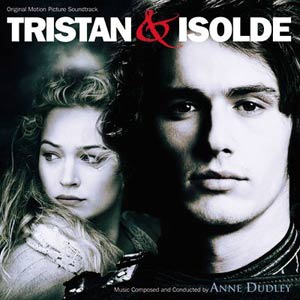Tristan & Isolde
Music composed, produced, orchestrated, and conducted by Anne Dudley
Performed by Unnamed Ensemble, featuring Victoria Wadpole (cor anglais)
Available on Varese Sarabande (VSD-6713)
Running Time: 53:00
Amazon UK Amazon US

20th Century Fox used the tagline before "Romeo and Juliet there was Tristan and Isolde" in the teaser for this tragic fifth century historical love story which takes place in Britain and Ireland. Starring James Franco and Sophia Myles it was directed by Kevin Reynolds, a veteran of such epic films as Waterworld, Robin Hood Prince of Thieves, and The Count of Monte Cristo. Producing were brothers Ridley and Tony Scott, the former having fostered the project as a potential vehicle for himself since the 1970s. It seemed to have all the ingredients for a blockbuster success. It was heavily marketed in the previews towards the younger generation complete with pop music. (So misleading was the music this reviewer decided almost immediately to pass on both the film and the score.) As it turned out the film got mixed reviews from the critics, a "kiss of death" mid January release, both of which resulted in a poor showing at the box office.
Four months later I was asked by my editor if I would be interested in doing a review. Thank heavens my brain had completely forgotten my earlier experience with the film because all my thoughts focused on the Richard Wagner classic opera. Well, wrong again on the opera theory, though for a change there is no pop music included on the soundtrack at all. Preview music can be so misleading and in this case the music was completely different. While it wasn't opera it was a delicious dark score accented with celtic style music for certain key tracks.
‘Young Tristan’ sets the entire mood for the vast majority of the score. A simple elegy, the sorrow of the track is certainly felt. ‘A Different Land’ is a Celtic style work featuring the cor anglais work of Victoria Walpole. (Wadpole recently worked with Dudley in a commissioned work titled ‘Divertissement’ performed on the BBC radio.) Her tone on the horn is superb as she produces rich resonant tones in the lower register and the nasal quality in the upper ranges which the english horn is so famous for. It’s a piece non-specific to the action of the scene it accompanies - you could have told me it was from one of the quieter moment of Road To Perdition and I would have been fooled! And there are other cues here that suggest that Thomas Newman style: ‘Wedding Cortege’ and ‘Back From The Dead’. This aside, there is much to appreciate. ‘Leaving Forever’, while only a scant 1:50 is an excellent example of how to write an adagio. In its own way it is as poignant as the Barber Adagio for Strings. It would be nice to hear at sometime a further development of the piece in a chamber orchestra work, something which Dudley seems to be doing lately.
‘The Drawbridge Is Lowered’ is probably the closest track to anything in the famous Wagner Opera and only because of the fanfare of the horns in the beginning. Elsewhere the orchestration emphasizes an intimate, ethnically-specific sound, Dudley making excellent use of the Celtic harp, fiddle, and flutes throughout. But these upbeat moments are the exception and this work for the vast majority of the 53 minutes is quite dark and somber. The pace remains very solemn through - allegro vivace never really emerges even in the action track ‘Ambush in the Forest’. The work is melodic in several sections, but no one melody stands out in your head the following day. The simple melody from ‘Young Tristan’ is repeated in the final track ‘None Can Die’ but it is still hard to pick up on. Fanciers of classical music could liken the score to the last few minutes of Tchaikovsky's Symphony No.6.
The engineering, mixing, and playing are superb. While no credit to the orchestra is given, my general suspicion is the recording was done in with members of the London Symphony Orchestra, as it was recorded in London at Angel Studios. Just a closing word of caution. This is most assuredly a score that requires a certain frame of mind as it is quite dark and somber. But for a quieter listening experience, this score does have a lot to offer the listener, despite the many references (in style at least) to Thomas Newman. Recommended.
Thomas Kiefner
Rating:
3
Return to Reviews Index